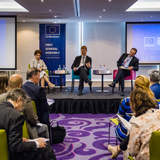
The 1st General Assembly meeting of the EU4Business initiative took place on 17 May in Brussels. It brought together over 80 representatives from the six Eastern Partner countries, country missions to the EU, implementing partners (EBRD, EIB, OECD, World Bank, GIZ, KfW, GFA, Eurochambres, ITC, IKZ, EBA) and European Institutions.
Discussions focused on key achievements and the way forward for EU4Business. The EU4Business Consolidated Report was also presented. The report reviewed implementation of the initiative from 2009-2016. A lively discussion followed on both the achievements and the challenges that need to be addressed in the years to come. The meeting was organised in two parts:
- Morning plenary session and round table discussions on the EU4Business initiative’s key achievements and way forward: Debate on strategic orientation to strengthen EU support towards the private sector in the EaP countries.
- Afternoon round table session on consolidating the EU4Business initiative: Working arrangements on monitoring and communication.
During the round-table discussions, participants shared their views on how to respond to current and future needs and challenges and on areas for new interventions. Efficiency, innovation and blending of financial and non-financial instruments were analysed in view of future projects and programmes. Ways to improve the business environment were also discussed.
The afternoon session was dedicated to consolidating the efforts of all implementing partners in monitoring EU4Business performance. The need to work together to improve the visibility of EU4Business among SMEs and other beneficiaries via communication actions was also highlighted.
EU4Business: a key part of EU policy in EaP countries
Lawrence Meredith, Director of Neighbourhood East at the European Commission’s Directorate-General for European Neighbourhood Policy and Enlargement Negotiations (DG NEAR), emphasised the importance of the EU4Business initiative and outlined the developments in the policy framework of the initiative especially following the Riga Summit. He emphasised the strategic importance of the DCFTA facility and also provided some figures underlining the achievements of the EU4Business. Mr Meredith mentioned the importance of continuing structural reforms in the EaP countries and the tailored and flexible support of the EU to the SME sector in the region.
Luc Devigne, Deputy Managing Director for Europe and Central Asia at the European Union External Action Service (EEAS), took stock of the achievements made by Partner Countries in the period of EU4Business implementation and underlined that EU support needed to be streamlined in a way to be more accessible and comprehensive for its beneficiaries.
A tool to implement national SME strategies
Julia Djarova, Executive Director at EY, a consortium leader supporting DG NEAR in its EU4Business coordination, emphasised the need for a holistic approach to successfully monitor and develop EU4Business, which should be coherent with national SME strategies and ongoing reforms and meet the needs of SMEs and Business Support Organisations.
Atena Duicu, expert in the EU4Business Secretariat, pointed out that all countries now had a national SME strategy. EU4Business actions are fully compatible with these strategies and the initiative is an important tool in their implementation.
Key results so far
Sacha Koppert, the EU4Business Secretariat expert on monitoring and reporting, presented the results of the EU4Business projects and programmes for the period 2009-16. Results are assessed along the lines of the four objectives of the initiative: access to finance; access to markets; access to knowledge and skills and improving the business environment.
Key results are:
- Almost 100 000 enterprises have received 190 000 sub-loans for a total value of EUR 1.5 billion;
- More than 93 000 jobs in SMEs have been supported and 10 000 new jobs created.
- Almost 40 proposals for policy strategies and legal reforms have been made, contributing to a favourable business environment and acting as an important catalyst for change.
The round tables came to the conclusion that in future EU4Business should:
- focus on improving access to finance through local currency lending and the development of the non-banking financial sector;
- develop the innovation infrastructure;
- implement further policy and legal reforms;
- enable greater access to markets, and support export promotion.
Video message from Kateriná Mathernová, deputy director general of the European Commission’s DG NEAR, concerning the 1st General Assembly




